Rick has been coping with Traumatic Brain Injury and Post Traumatic Stress Disorder after sustaining serious injuries in Iraq. But a rescue dog’s unwavering companionship and calm disposition give him relief from his invisible wounds.
Born to serve
Rick grew up in rural Oregon not far from Walla Walla, Washington.
“It’s a primarily agricultural area,” he says. “There’s not a lot really to do in this town.”
The war veteran recalls a privileged upbringing as the son of a farmer and realtor. But he was uninterested in those careers.
“I wanted something else.”
As it happens Rick’s family has a proud military heritage. His grandfather was a brigadier general in the Army, his brother was an Air Force colonel, and his cousin served in the Navy.
So Rick decided to continue the family tradition and enlisted in the Marines.
Of peace and war
After basic training Rick’s first military occupational specialty, or MOS, was a heavy-wield vehicle operator. These professionals are often called the lifeblood of the Marines since transport is so critical to nearly every military operation. During the course of his enlistment Rick served with the military police as well.
However, change was afoot.
Rick transitioned to the Army National Guard after his wife at the time expressed her unhappiness with the demands of Marine Corps life.
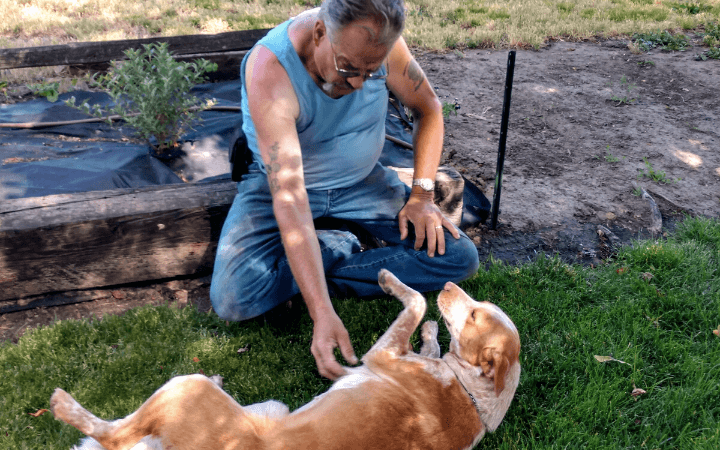
In the Army he served as a bulk fuel specialist, again providing essential support to military transport. In this role he was responsible to receive, store, and ship fuel and related products to wherever the Army needed them.
At the time Rick was the highest ranked specialist in his MOS in all of Washington state.
But life would change yet again – dramatically and forever.
Stressful days and sleepless nights
In 2003 Rick deployed to Iraq. At first he continued his responsibilities as a fuel specialist until his commanding officers learned that he had other valuable skills from his time with the Marines.
“When they found out I was military police, I got to do a bunch of extra duty,” he shares. “After I would fuel everything that was there on post, I would pull security on combat engineers.”
Military police, or MPs, provide a range of law enforcement and force protection duties all over the world. The additional responsibilities meant very long days for Rick with only a few hours of sleep each night.
For nearly a year Rick worked on a handful of major projects in Northern Iraq, outside of Mosul. However, the deployment was memorable for mostly tragic reasons.
The career veteran’s perspective of the world changed when he witnessed the destruction and dire needs of a war-torn region.
“It made me appreciate how much I have here now.”
The very bad day
Rick’s tour in Iraq did not end well.
Nearly a year into his deployment he experienced what he would only describe as “a bad day.” He was guarding combat engineers when the group came across an improvised explosive device, or IED.
“I don’t recommend finding those,” he says. “Explosions have a tendency to rattle a few things.”
All Rick remembers was a big flash and then waking up after surgery. He was triaged in field and then transported to Europe for more extensive care.
“The medical facilities in theater,” he says, “all they will do is immediate trauma surgery to put you together and ship you somewhere else.”
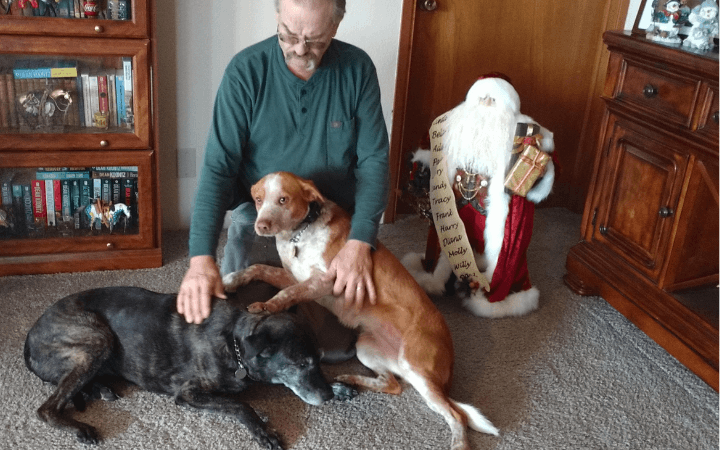
That ‘somewhere else’ was Landstuhl Regional Medical Center, an overseas United States military hospital in Germany. Once Rick received treatment and was stable he was transported to Fort Lewis in Washington for 10 months of intensive rehabilitation. It was there that the long process of being medically discharged from service began.
“When they do a medical discharge there’s a lot of paperwork,” he says. “All of your doctors have got to do reports, and they’ve got to do reports and find out what it would take to buy your contract out.”
Rick served more than 20 years in the military before separating from service with an honorable discharge. He finished his career with the 101st Airborne, the Army’s storied air assault division.
But while Rick was leaving the war he would discover that the war would not ever be leaving him.
Invisible wounds of war
In many ways Rick’s life started anew after his separation from service. He is 100 percent disabled as a result of the injuries he sustained in the IED blast.
The veteran still has lasting impacts of Traumatic Brain Injury (TBI) and Post Traumatic Stress Disorder (PTSD). While each is challenging to manage on its own, it is even more difficult for veterans to experience in tandem.
“I got my brain rattled pretty bad,” he shares. “I have a hard time multitasking and staying focused and on track depending on what I’m doing. That’s another reason I stay home a lot.”
However, upon his discharge Rick did not have anywhere to go. While he was not homeless in the traditional sense, he was a man without a home.
“I was pretty much homeless,” he shares. “My mother had moved. I didn’t really have any place to come home to.”
So Rick bought an RV to live in, and invested in the small carpet cleaning and wood restoration business he managed before he deployed.
“I took my severance package and upgraded everything in my business because I knew it would be four to five years before the VA [Veterans Administration] would start cutting a check.”
The nature of Rick’s invisible wounds – the TBI and PTSD – made it impossible to do the physical labor that the business required. He hired workers to keep the business going so that he could survive financially.
Still, Rick does not dwell on the paths not taken. He is rightly proud of his service even though it left him disabled for life.
“I did my job. That’s the job that I chose,” he says, “The possibility of being injured comes with that job.”
Love and loss
Today, Rick lives on a beautiful piece of land in Washington that he shares with his wife Laurie, and three dogs.
It is the second marriage for both. The couple’s property has orchards and a landscaped front yard. Rick takes pride in his small spot of paradise, especially considering the challenges he endured to earn it.
“To come home and be homeless, that was something else, that was an experience I don’t want to go through again.”
A sense of home is not the only thing that Rick lost during his military service. He still remembers the profound grief he experienced upon returning from Iraq and having to deal with losing his dog.
“The dog that I had when I left for Iraq, she had died,” Rick shares. “All of our dogs were adopted from the humane society. I’d rather get an animal from them because the animal needs a home.”
While the couple already had two dogs, one was more of Laurie’s pet. Their eldest dog, Brandy, was already 14 years old. Rick thought it would be best to adopt another dog before he loses her, too.
“I wanted to have another dog because when the first one passed, it sent me into a tailspin.”
“…calm, cool, and collected”
In April 2019 Rick and Laurie visited Blue Mountain Humane Society in Walla Walla. Since 2015 the shelter has placed dozens of pets with veterans in our program and offers them 50 percent off adoption fees.
The shelter staff told Rick about Pets for Patriots and our companion pet adoption program for military veterans. After applying and being approved he set out to find the right dog.
It would be almost one month til the Army veteran met his match. But as they say, all good things come to those who wait.
Rick still remembers the first time he set his eyes upon Kira.
“She was just sitting there,” he says, “calm, cool, and collected.”
The dog’s low-key demeanor was extremely appealing to Rick. Because of the impacts of TBI and PTSD, he was not looking for a high-strung or excitable dog. Still, he believes that dogs adopt their humans more than people pick their new pets.
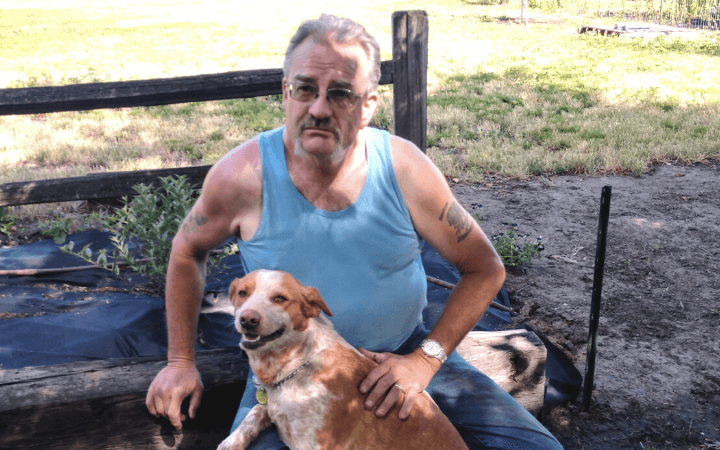
“All three of my dogs picked me,” he shares. “If you pick the dog and they’re ambivalent about you, you have a lot of work cut out for you.”
At the shelter, Rick played a short game of fetch with Kira. That sealed the deal.
So in May 2019 Kira joined her new pack. Rick was thrilled, and appreciates the many benefits he receives by adopting a companion pet through our program.
“You gave me a $150 gift card!” he exclaims. “You paid me to take a dog.”
Living with Traumatic Brain Injury
Kira is protective, smart, and sensitive to Rick’s needs. Her calming presence has helped him deal with the daily frustrations of living with TBI and PTSD. She will often seek him out for attention which, in itself, helps keep him grounded.
“My startle response is still way up there,” he says. “I got to make sure everything is locked and secure when I go to bed.”
Still, the rescue dog’s mere presence is therapeutic. And while Rick may always be hyper-vigilant it helps him to have dogs who feel duty-bound to protect him.
“Just having an animal is good,” he says.
For her part, Kira appears to have a special way of understanding what the Iraq war veteran needs. She seeks him out throughout the day to check up on him and demand affection.
“The traumatic brain injury doesn’t allow me to clearly focus and figure out if there’s a better way to do this, I just need to slow down, stop and look at it,” Rick shares. “Having Kira the way she is about coming and checking on me throughout the day really helps.”
Kira has a keen way of seeking out Rick when he is working on the property. It does not matter if he is in the orchard or in the woodworking shop, where he builds furniture and various artworks.
Kira always finds him.
“She’ll come find me, it’s time for me to give you some love,” he shares. “Few minutes of that and it gives me a break. If it wasn’t for the dogs I probably wouldn’t take a break.”
Watch out, cantaloupe
While Rick is a firm believer in pet adoption, he confides that training a shelter animal can be overwhelming for someone with TBI and PTSD. Still, the Iraq war veteran is pleased with the intuition and protective spirit of his newest recruit.
“She has to be with us,” he says, and then clarifies, “she has to be with me.”
Kira will even forgo laying on her comfortable dog bed if it is not in the same room as Rick. She will generally choose to be with him. There are some exceptions, however.
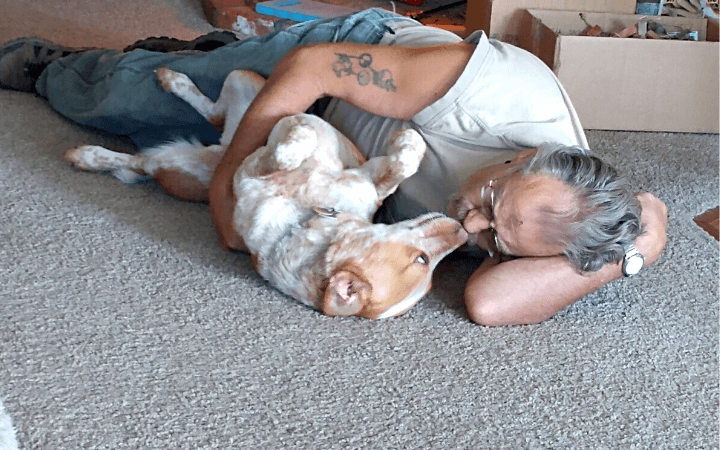
The rescue dog has learned to stay out of the kitchen, but seems to think that the garden belongs to her.
“She gets in the garden and she loves cantaloupe,” Rick says. “My wife plants all this stuff in the garden and Kira is in the garden having lunch!”
Kira has even rallied the other two dogs to join her in dining on the raspberry bush. It is a small, sweet sacrifice that the couple is willing to make.
Thank you for your service
Rick wants other veterans to know that their service is appreciated and that their lives matter. And he backs up that belief by using his woodworking artistry to benefit those who served.
“I make walking sticks and canes, and will give them to vets.”
The war veteran even creates hand-made plaques that say, ‘Thank you for your service.’
“It helps to hear it,” he says. “They didn’t do it for the medals of the ribbons or for the recognition. They did it because they wanted to be a part of something special.”
For more than 20 years Rick was indeed part of something special, even if that fateful day in Iraq left him with the lifelong impacts of TBI and PTSD. Now he is home, he is safe, and he is loved – by his wife, Laurie, their children and grandchildren, and of course their trio of dogs.
Adopting Kira has not erased the war veteran’s trauma, but it has offered Rick a way to move forward and grant himself some grace. And that just may be the best medicine in the world.
“It’s a fact,” he says, “an animal changes your life.”


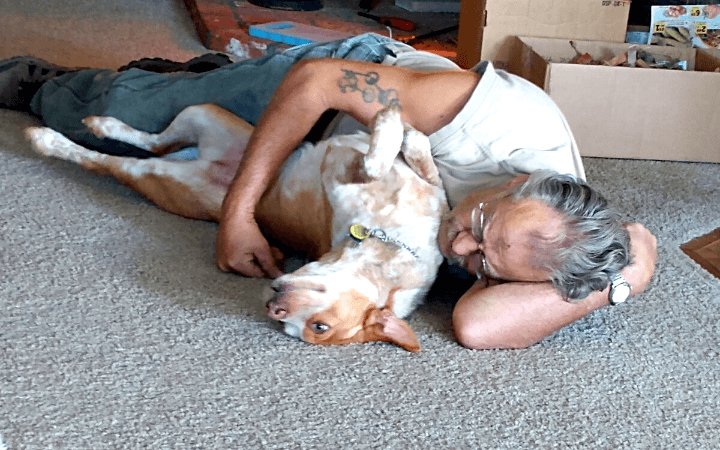


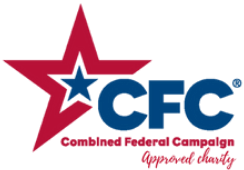



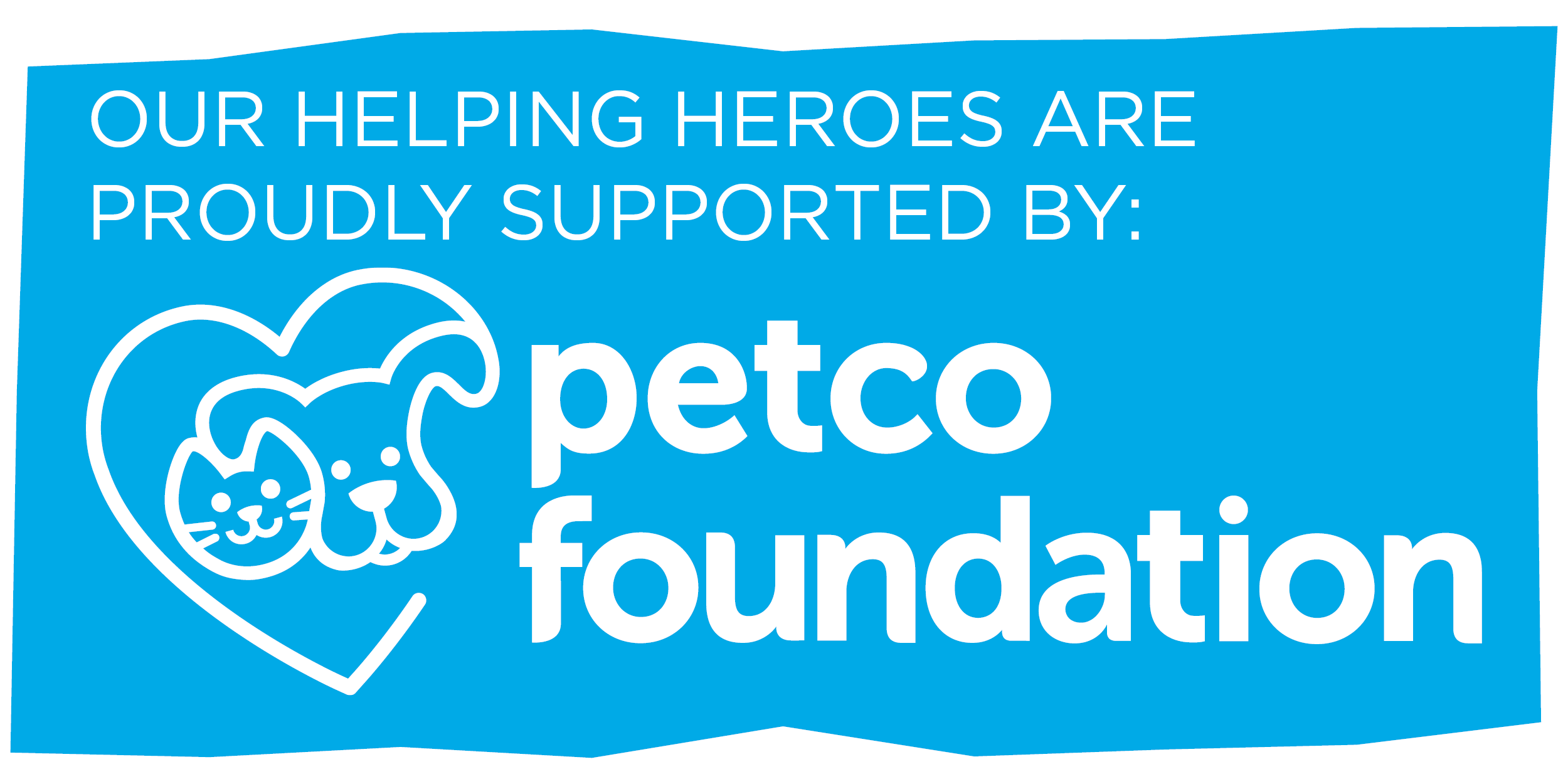
Thank you for your service and sharing your story. I am thinking your wood working and being creative is very therapeutic to/for you.
I too live in Washington State, south central from you next to the Columbia River with Oregon over yonder.
I agree with you, shelter dogs adopt humans. They have an intuition. Kira could sense your kind demeanor!
What a beautiful story! I also live in Washington State. Both my husband and I are veterans. We have 2 rescue dogs.
If I wanted to purchase a couple of your plaques, how would I go about doing that?
Dear Rick,
Your story brought tears to my eyes! All dogs are wonderful, but Kira is super special. You two are lucky to have found each other. Blessings and thank you for your service.